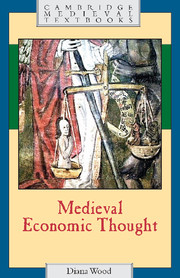Book contents
- Frontmatter
- Contents
- Preface
- List of abbreviations
- Introduction: problems, evidence, and background
- 1 Private property versus communal rights: the conflict of two laws
- 2 Wealth, beggary, and sufficiency
- 3 What is money?
- 4 Sovereign concerns: weights, measures, and coinage
- 5 The mercantile system
- 6 The just price and the just wage
- 7 The nature of usury: the usurer as winner
- 8 The theory of interest: the usurer as loser
- Conclusion
- Appendix: Notes on the main writers and anonymous works mentioned in the text
- Glossary of terms
- Select bibliography
- Index
- Cambridge Medieval Textbooks
8 - The theory of interest: the usurer as loser
Published online by Cambridge University Press: 05 June 2012
- Frontmatter
- Contents
- Preface
- List of abbreviations
- Introduction: problems, evidence, and background
- 1 Private property versus communal rights: the conflict of two laws
- 2 Wealth, beggary, and sufficiency
- 3 What is money?
- 4 Sovereign concerns: weights, measures, and coinage
- 5 The mercantile system
- 6 The just price and the just wage
- 7 The nature of usury: the usurer as winner
- 8 The theory of interest: the usurer as loser
- Conclusion
- Appendix: Notes on the main writers and anonymous works mentioned in the text
- Glossary of terms
- Select bibliography
- Index
- Cambridge Medieval Textbooks
Summary
INTRODUCTION: USURY AND INTEREST
Usury and trewe interest be thinges as contrary as falshed is to trewth. For usury contayneth in it selfe inequalitie and unnaturall dealinge, and trewe interest observeth equitie and naturall dealinge.
This sixteenth-century English quotation sums up the difference between the theories of usury and interest. We have already seen the usurer as winner – the one who gained from a loan at the expense of the borrower. Usurers, however, did not always win. In the mid-thirteenth century Ptolemy of Lucca noted that ‘in loans a lender often suffers outrage, because it is in the nature of a borrower for it to be difficult for him to return a loan’. John Bromyard reported complaints by usurers about rich bad debtors who deserved to be charged higher rates of interest because they did not make repayment at the end of a loan. He seemed to think that the false and deceitful debtors were a suitable match for the greedy usurers. Nevertheless, the risk of loss was always staring the usurer in the face.
Our final discussion is about interest, which was supposed to compensate for loss or potential loss. The idea derived from Roman law. In Latin inter-est meant something which ‘is between’; it meant difference. Payment of inter-est was meant to restore the lender's financial position to what it had been before he made the loan, to make up any difference between what was given and what was returned or was likely to be.
- Type
- Chapter
- Information
- Medieval Economic Thought , pp. 181 - 205Publisher: Cambridge University PressPrint publication year: 2002



